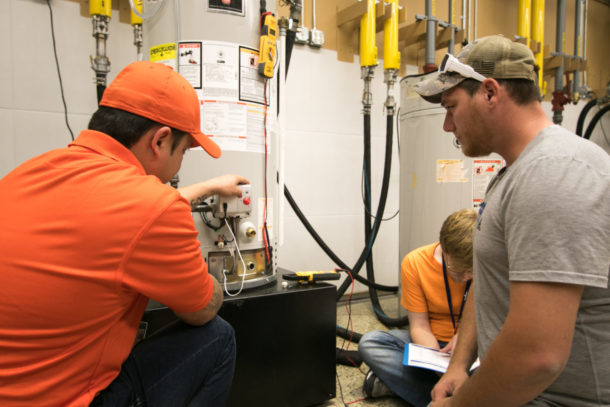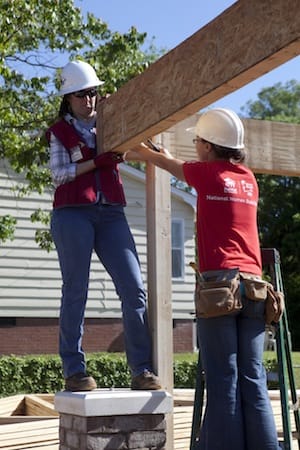As a plumber, the chances are that you are used to working alone or within a small team. However, it is important to keep in mind that most clients will address plumping works and renovations as part of a larger, more extensive project. As such, they are likely to look for trusted traders and ask Read more
Allies

As a plumber, the chances are that you are used to working alone or within a small team. However, it is important to keep in mind that most clients will address plumping works and renovations as part of a larger, more extensive project. As such, they are likely to look for trusted traders and ask for recommendations and referrals.
So, if you are looking to develop your plumbing business and bring more projects and work to your company, partnering with other contractors and networking with specialists in the field is key! Here is all you need to know.

Minimize The Risk of Errors
When it comes to replacing the plumbing system in a typical home, homeowners can spend between $3,000 and $16,000 – which, alone, is a considerable investment! But there’s more to that! Indeed, most homeowners will tackle plumbing projects as part of a home makeover that often involves renovating the bathrooms or kitchen. These projects can not only be costly, but come with a high risk of errors and mistakes!
By working with the other contractors involved in the project, you and your plumbing team can minimize the risk of costly mistakes and remediations.
Enhance Communication Throughout The Project
By working with the other contractors involved in the project, you can boost communication and ensure that the client’s expectations are effortlessly met. For example, if a client is looking to update a house for accessibility and aging in place, you may take care of making the bathroom, bathtubs, or shower more accessible, while also working with safety experts to install alarms, rails, and other safety features.
Build A Network of Contacts
The majority of homeowners and clients looking to tackle a renovation will look for a contractor they can trust. To do so, they are likely to:
- Ask for referrals and personal recommendations from trusted family members and friends
- Speak to contractors they can trust to check whether they know a specialized plumber, electrician, or trader
- Check online professional directories
- Look for contractors with an excellent online reputation and great reviews
- Ask at the local hardware store
Having a network to rely on can make your business more easily discoverable by clients looking for your services.
Leverage Shared Tools
As a single contractor, the chances are that you may not have all the tools and equipment needed for highly complex projects. In turn, you may often find yourself purchasing or renting costly gear, which can take a toll on your cash flow. That’s where working with other contractors and sharing the tools and equipment available – including a bulk bag filler, a soldering station, or a drain camera system – can help to save money and boost your business.
Exchange Expertise
Although each contractor involved in the project will have the skills needed to complete their tasks, it is important not to underestimate the benefits of sharing experiences and capabilities. These could be from past projects, recent innovations, or training courses. Be sure to interact and communicate with the other professionals involved in each project to enhance your skill set and capabilities – and, ultimately, keep your business relevant!

In March, we celebrate Women’s History Month to honor the heroic and historic accomplishments of women in all areas of accomplishment. In plumbing, we look to Lillian Baumbach, the first female master plumber in the United States. Women, like Lillian, paved the way for modern female plumbers and other tradeswomen. The best form of honor Read more
In March, we celebrate Women’s History Month to honor the heroic and historic accomplishments of women in all areas of accomplishment. In plumbing, we look to Lillian Baumbach, the first female master plumber in the United States. Women, like Lillian, paved the way for modern female plumbers and other tradeswomen. The best form of honor is respect. There is no better way to respect tradeswomen than acting like a true ally.
What is an ally? An ally is an individual, contractor, manufacturer and/or retailer who stands with and for tradeswomen.
Women constitute a mere 1.5% of the construction trades industry workforce. With numbers so low, it’s easy to feel alone and isolated in your work environment. Below, find some tips to being an ally.
An ally:
 Mentors – Providing sage advice to apprentices and young people in the skilled trades helps them feel welcomed in their work environment. This extends to facilitating networking and social events.
Mentors – Providing sage advice to apprentices and young people in the skilled trades helps them feel welcomed in their work environment. This extends to facilitating networking and social events.- Does not assume – When in doubt, ask. Also, do not assume stereotypes about women or women who work in the skilled construction trades. Having low expectations of tradeswomen is another gaffe. Do not assume tradeswomen possess less experience or cannot complete the same tasks as a tradesman.
- Isn’t shy – An ally calls people out and does not tolerate inappropriate and demeaning humor or remarks. Additionally, get involved with women’s committees. Both men and women can support women in the trades. An ally can also get involved with policy. Share information about the Paid Family and Medical Leave Act, sexual harassment training, and pregnancy discrimination.
- Doesn’t mansplain – This should go without saying.
- Encourages all voices – Keep an open mind. As a leader, create environments where all voices can be heard and appreciated.
It’s not simple, but it’s worth it. Allies, like tradeswomen, come in all shapes, sizes, colors, and creeds. An ally is a powerful tool for recruitment and retention of tradeswomen. Rest assured, tradeswomen will still be here with or without allies. But, they help to improve the workplace for all.
 Guest Blogger – Allie Perez founded Texas Women in Trades in 2013, an organization working to bring more women, minorities, and young people to the trades. She also serves as the VP of Marketing and Operations at George Plumbing Co. in San Antonio and on the National Taskforce for Tradeswomen as the Communications Committee Co-Chair. A graduate of New York University, Allie has contributed to trade periodicals for more than seven years. To contact her directly, email texaswomenintrades@gmail.com.
Guest Blogger – Allie Perez founded Texas Women in Trades in 2013, an organization working to bring more women, minorities, and young people to the trades. She also serves as the VP of Marketing and Operations at George Plumbing Co. in San Antonio and on the National Taskforce for Tradeswomen as the Communications Committee Co-Chair. A graduate of New York University, Allie has contributed to trade periodicals for more than seven years. To contact her directly, email texaswomenintrades@gmail.com.

 Mentors – Providing sage advice to apprentices and young people in the skilled trades helps them feel welcomed in their work environment. This extends to facilitating networking and social events.
Mentors – Providing sage advice to apprentices and young people in the skilled trades helps them feel welcomed in their work environment. This extends to facilitating networking and social events.